Property of the Chita Republic
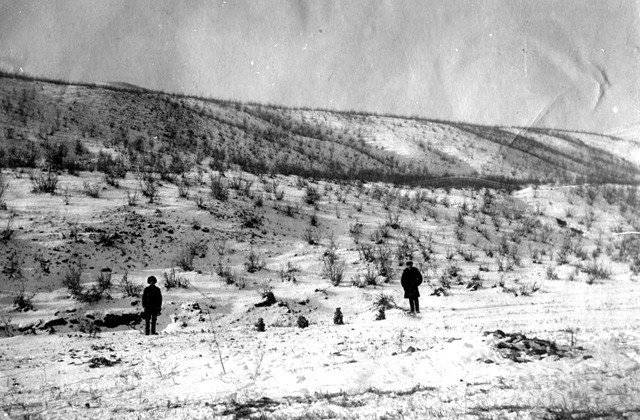
Of stories Russian separatism
The events of 1905 — 1906 in the Transbaikal region are clearly underestimated by domestic historiography. In open sources, only fragmentary data and patterned interpretations can be found: the Chita armed uprising is considered solely as an action of the Bolsheviks. The role and degree of participation in it of people with other political views did not receive an objective assessment. However, to reduce this story to the confrontation of red and white is meaningless. In addition to the Marxists, in addition to the guardians of the regime, in addition to the workers' railway workshops and soldiers, the mass of ordinary people was involved in the processes that took place in Chita, Nerchinsk, Verkhneudinsk and other cities of the Trans-Baikal region. Those who brought to the streets of personal, through a protest.
The then Transbaikalia is a set of prisons built at the turn of the centuries at the mountain mines: Pokrovskaya, Akatui, Zerentui stone, Kadainskaya, Maltsevskaya. This is the traditional place to link convicted on political articles. Publicist Nikolai Chernyshevsky, poet Mikhail Mikhailov, populist Hippolytus Myshkin passed through penal servitude in Transbaikalia. At the beginning of the 20th century, about 70 former members of the parties “Earth and Volition” and “Narodnaya Volya” lived here. Transbaikalia is the 11 locomotive depot, the largest of which were located in Verkhneudinsk, Chita, Khilka, Shilka. These are nine thousand highly skilled workers and employees who worked on 14 — 16 hours per day in the Trans-Baikal section of the Siberian Railway, from the Mysovaya station to the city of Sretensk.
The first Social Democratic circle in Chita, at the Main Railway Workshops, was organized in 1898 by professional revolutionaries Moses Gubelman and Grigory Kramolnikov. In April, the Chita Committee of the RSDLP was established in 1902. Then they spent the Maya, as Marxist Emelyan Yaroslavsky told in a note for the Iskra newspaper:
“... At Easter, among the workers of the railway workshops, proclamations were distributed, inviting to the celebration of 1 on May ... They most strongly affected the governor Nadarov and the townsfolk. The authorities began to seriously prepare for the suppression of the rebellion. Nadarov gives the order on the troops - to issue checkers to two hundred Cossacks. Cook the guns. Arm two hundred infantry and ... no mercy! 1 On May morning, the weather was abominable, and the workers themselves did not want to celebrate this day. But the troops were still sent. The 150 man workers made a Mayday celebration - they set off with a red flag into the forest with singing. They were equipped with troops that were in vain for a rebellion ... ”
Manifesto and its consequences
With the beginning of the Russian-Japanese war, Transbaikalia became the immediate rear for the army operating in Manchuria.
27 January 1905 of the year (hereinafter, old-fashioned dates) workers in the Chita main railway workshops and depots gathered at a rally and demanded the overthrow of the autocracy, the convocation of a constituent assembly on the basis of universal, equal, direct and secret voting, the establishment of a democratic republic and the cessation of war . 18 April authorities imposed martial law.
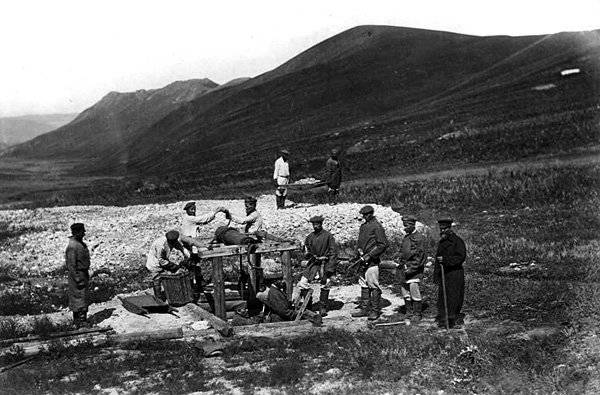
The main events in Transbaikalia took place in October 1905 of the year: railway workers went on strike on 14, mail, telegraph, telephone exchange, teachers and students joined them. Irkutsk Governor General Count Pavel Kutaisov sent a telegram to Nicholas II on October 19: “The situation is desperate. There are almost no troops. Riot full, universal. I am afraid of reinforcements of the rioters by the arriving railway workers. There is little hope to pacify. ”
In the country as a whole, only in the period from 12 to 18 of October more than two million people went on strike in various industries. 17-th number in connection with the continuing turmoil was promulgated the highest manifesto, initiated and developed by the chairman of the Cabinet of Ministers Sergei Witte. “From unrest ... there may be a deep disorder in the people and a threat to the integrity and unity of Our state,” it said. The manifesto proclaimed the convocation of the State Duma and civil rights and freedoms, such as: freedom of conscience, freedom of speech, freedom of assembly and freedom of union.
But in an empire engulfed in a revolutionary fire, freedom could not help turning into one of its opposites — dictatorship or anarchy. Both the regime and its opponents needed it not for creation, but to achieve short-term political goals. After October 17, 1905, the nation did not come to a long-awaited agreement, but to a new round of confrontations, to unprincipled politicking and to all-embracing hatred. After anti-government and anti-monarchist speeches, in which Jews took a large part, 690 pogroms of Jewish shops, shops and houses in 660 settlements took place. Between 18 and 29, October, about 4000 people were killed, about 10 000 injured.
In many ways, this slaughter was a consequence of the fact that the authorities in the center and in the provinces, confused, were eliminated from performing their direct duties. The manifesto was prepared in secret, no notifications were sent to the field, and after publication of the document - no explanations. The governors and police chiefs, not knowing how to behave in the "conditions of the constitution", did not dare to give prohibitive orders and sent requests to the capital. Officials in St. Petersburg, also not instructed, responded with a delay of several days.
The newspaper Novoye Vremya from October 24 provides a selection of short messages from correspondents from the field:
“In Kremenchug hooligans make pogroms without meeting resistance. Many seriously injured. Atrocities of thugs hiding behind patriotic slogans occur with impunity in Novgorod. Robberies and beatings in Balta, Surozh. In Kazan, many killed and wounded students and policemen. Fires and killings in Baku. Robbery is made in front of the troops. In Tomsk smashed the house of the mayor. Passions strongly inflamed. In Tiflis, a grand peaceful demonstration ended in a shootout; many victims ... In Kiev, 18, 19 and 20 of October, ambulance doctors registered 26 killed and 204 injured ... "
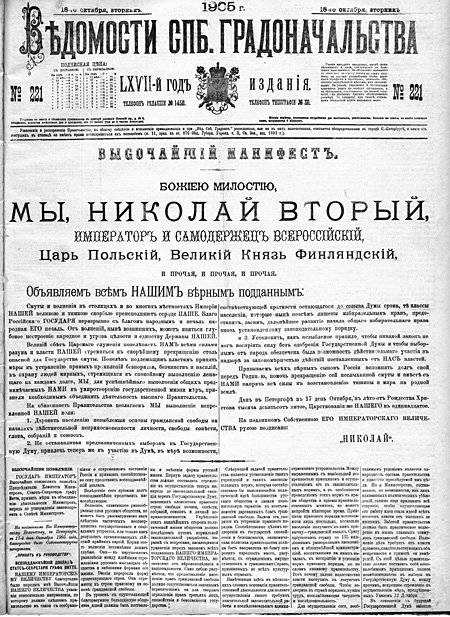
In one of the telegrams of the Russian Telegraph Agency from October 20 it was reported: “Rostov-on-Don. Yesterday the whole city was in the power of the mob. The crowd unceremoniously carried off the stolen things in her arms, carried them away in cab-drivers and drogs. The houses formed warehouses of goods. At one o'clock in the afternoon, arson attacks began in many places in the city. The picture of destruction is beyond description. ”
But the curious information of the “Government Gazette” is already from 6 December 1905: “Passenger train No. 13, traveling to Riga with golden coin transport for the local office of the State Bank, was attacked by revolutionaries near Valka. The troops arrived in time scattered the attackers. ”
"Sense of Freedom"
In the All-Russian October strike, railway workers played a key role; they were the ones who paralyzed the country, turning it into isolated islands scattered throughout the vast territory of the city and all over. “Due to the strike of the Syzrano-Vyazemskaya, Moscow-Kiev-Voronezh and Ryazan-Ural railways, the traffic was stopped. There are no newspapers, ”the Russian Telegraph Agency informed October 10 from Kaluga.
But it is time to return to the situation in Transbaikalia. On November XNUM, the Council of Soldiers and Cossack Deputies was elected at a multi-thousand meeting in Chita, an armed workers' brigade of four thousand people was formed. The participants entered an eight-hour working day. The council and the squad was headed by a member of the RSDLP, political exile Anton Kostyushko-Volyuzhanich. The military governor of the region, Lieutenant General Ivan Holshchevnikov, formally retained the position, but had no real influence on the events. Especially as the five thousand strong garrison of Chita joined the rebels.
The new government, which would later be called the "Chita Republic", took advantage of the fact that during the Russian-Japanese war a large number of accumulated in the warehouses in Chita weapons and ammunition. For two days, 5 and 12 December, vigilantes easily captured one and a half thousand three-line rifles here, December 22 two thousand more, and 5 and 11 in January 1906, at Chita-1 station - more than 36 thousand guns, 200 revolvers, explosives .
In early December, Ivan Babushkin arrived in Chita from Irkutsk, who was appointed to the local committee of the RSDLP. Such as he, sincere personality in the cynical Stalin era will be exterminated completely. The diaries of this pioneer of the revolution are solid “sketches from life”, testimonies of dozens of people who filled his short life with meaning.
Here, for example: “From Shuya, up to three thousand people write about outrageous orders at the sit-printing, weaving and spinning factory of Pavlov. In this factory, the owner and his sons in the full sense of the word are libertines, and one of the sons has grown to madness and is now in mental distress and has got a bad illness. Thanks to all this, it is difficult for any girl to remain completely safe from these arrogant, shameless representatives of Russian capitalism. Pavlov made a kind of harem from the factory. ”
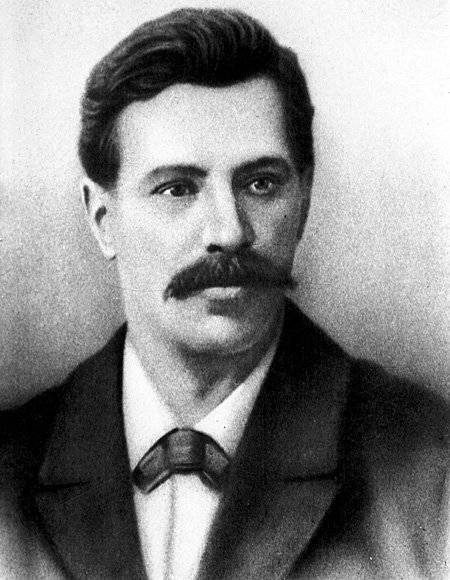
22 December 1905 of the military posts guarding the building of the post and telegraph office in Chita were replaced by the posts of the working militia.
To suppress the uprising, two punitive expeditions were sent to Chita: a detachment of General Pavel Rennenkampf marched from Manchuria, and troops from the west commanded by General of Infantry, Baron Alexander Meller-Zakomelsky. It was the people of the latter who intercepted 18 on January 1906 of the year at the Slyudyanka station of the Trans-Baikal Railway Ivan Babushkin with comrades carrying weapons for workers from Chita to Irkutsk. There was no trial. The scene that preceded the shooting of the group was recorded by an officer, Evetsky, in the coach car:
“The question arose of what to do with the arrested. The baron decided: "Well, what about messing with them? Handing them to hell with the gendarmes." The conversation takes place at dinner, and, having heard this decision, Martsinkevich asks the baron for permission to report to him about the one arrested. He is recommended by an inveterate revolutionary who almost made the whole Russian revolution ... "Well then? So we will shoot him," says Meller calmly, puffing on a cigar and sipping margo. All are silent. Martsinkevich reports two more. “Well, we will shoot the three,” the baron says just as calmly. Kovalinsky intervenes and reports on two more revolutionaries. "And shoot them ..." "
22 January 1906 of the year in Chita without a single shot entered the Rennenkampf expedition. Began arrests of the instigators of the turmoil, earned martial courts. Before 21 in May, 77 people were sentenced to death, and on March 2, four were shot on the slope of the Titovskaya Volka - Kostyushko-Volyuzhanich, assistant head of the Chita-1 railway station, Ernest Popsman, worker of the main railway workshops Procopius Stolyarov and clerk of the Consumer Society. Isai Weinstein.
“Revolutionary newspapers in the entire region ordered the printing to be closed, printing presses to be sealed, editors and publishers arrested. The eastern part of Transbaikalia is threatened by hunger; there are no flour reserves, ”Rennenkampf reported to the emperor.
The materials of court cases indicate the feverish rush in which these processes took place. And also - on the involvement in the rebellion of people of different classes, social groups. So, in the number of convicts were sent to hard labor: engineer Vitold Erdman, from the nobility of the Kovno province; machinist Joseph Yasinsky, from the peasants of the Volyn province; the workshop of Ivan Shilko, from the peasants of the Perm province; Ivan Okuntsov, director of the national school, from Transbaikalian Cossacks; the head of the city hospital, Eser Isai Shinkman; Turner Indrik Rosenberg, from the peasants of the Province of Courland.
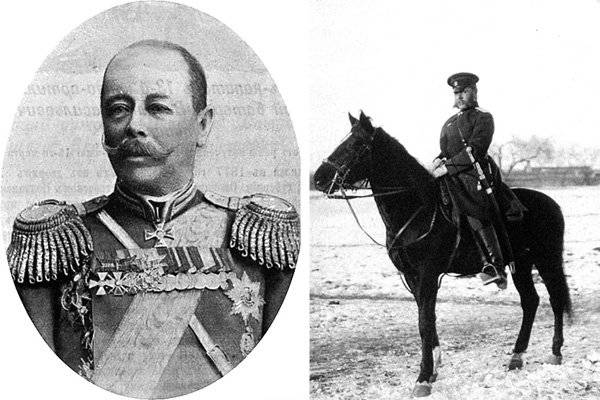
Yasinsky was accused of agitating the workers to overthrow the existing system, handing out captured weapons. But in belonging to the revolutionary party is not suspected. Erdman at the station in a drunken state, as recorded in the protocol, shouted insults at the king.
Among those who were sentenced to death, then replaced by hard labor, were: Pyotr Limorenko, a military man, an instructor of the fighting squad in Verkhneudinsk; the mechanic Vasily Bashenin, from the townspeople of the Saratov province; mechanic Mikhail Rybnikov, a petty bourgeois of Orel province; Engineer Vladimir Zmiev, from the peasants of the Tomsk province. The last three were in 1906 for 19 years. Serpent convicted for the distribution of proclamations, blasphemy, for shooting an icon.
A native of Chita, Ivan Krivonosenko, a tradesman, the father of four children, who served as an accountant before his arrest, received a sentence for actively campaigning around the villages around Chita.
As it turns out, there were almost no professional revolutionaries among the organizers and participants of the Chita armed uprising. The bulk of those who rallied, seized weapons in warehouses, poured into the workers' squads, were people who, as noted by Sergei Witte, "at once captured a sense of freedom." “Everyone, from young to old, understood and felt that it’s impossible to live this way as we have lived until now,” wrote the head of the government in an article published in Novoye Vremya. - The shame and humiliation of the Fatherland with their own eyes proved that the kingdom of arbitrariness must be put an end to. No repression can destroy this consciousness. ”
In 1905, the first official of the state spoke about the kingdom of arbitrariness.
Information